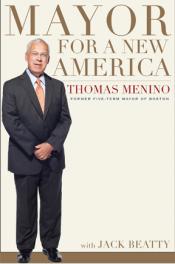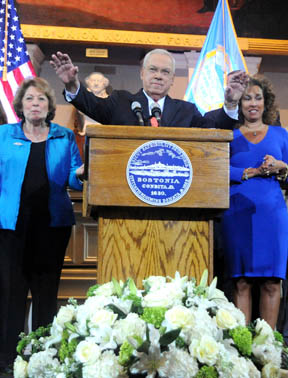October 1, 2014
 Menino MemoirThomas Menino's "Mayor for a New America" hits stores and tablets on October 14. It will no doubt find a well-deserved place in the libraries of Bostonians who have a keen interest in city history and politics.
Menino MemoirThomas Menino's "Mayor for a New America" hits stores and tablets on October 14. It will no doubt find a well-deserved place in the libraries of Bostonians who have a keen interest in city history and politics.
But it will find that shelf-space too quickly for many of us. At just 250 pages, the book is an all-too-quick read that leaves those well versed in the Menino era wanting more. Those thirsty for a serious, deep-dive chronicle and analysis of the Menino era will have to wait. Perhaps the publishers and the authors should have, too.
Co-author Jack Beatty, the respected biographer of another great Boston mayor, James Michael Curley, does not intrude much or enough here. It’s Menino’s voice and style that rings true in the prose—simple and to the point.
Menino "spares" us a chronicle of his ten-year stint on the city council, which gets truncated to a few anecdotes about the run-up to his 1992 campaign to win the council presidency. We get little new insight on how Menino, a relative unknown from “the sticks” of Readville, came to forge alliances with the Irish power brokers Jim Kelly and Dapper O’Neil, the latter of whom Menino lays out as the unreconstructed bigot and homophobe that he was. We also don't gain much new traction on what informed Menino's progressive streak— the one that made him a more successful citywide draw in his breakout 1993 victory over Jim Brett.
His acumen as a City Hall insider is related primarily through passages from Boston Globe columnists and editorial board writers, most of which salute Menino’s diligence as a budget task-master who keeps a more reckless Ray Flynn at bay. It’s a flaw of the book that Menino and Beatty rely too much on Globe columnists and scribes to the exclusion of other listening posts.
The book has its strong moments. Menino is candid and revealing in his comments about race and ethnicity. He writes about the pride he felt in becoming the city's first Italian-American mayor— and in ending the "green tide" that dominated the office for most of the 20th century.
"By the 1980s Italian-Americans my age were tired of the 'Pick-a-Mick' choice of mayors on the ballot and for once wanted to vote for one of their own," Menino writes. "The green tide in Boston politics was receding, and Italians weren’t the only group standing on the beach happy to see it go.”
The subject of Boston’s desegregation or “busing” battles of the 1970s are touched on here, too — and from Menino we get conflicting views. Early on in his re-telling of his Hyde Park days, he denounces the busing implementation as a “failed” experiment, one that left him with “lasting doubts about ‘sweeping solutions,’ ‘bold plans,’ and ‘fundamental transformations’ for the problems of city life.”
“You can debate whether busing was a justified remedy for Boston’s separate and unequal schools,” Menino writes. Really?
And yet, Menino later concludes, and accurately, that the failures of the city’s desegregation era had found their greatest villains in the pre-crisis politicians like Louise Day Hicks and John Kerrigan, lawyers who knowingly led the city into the abyss.
“The schools weren’t a priority for the Irish American pols who dominated the [school] committee,” Menino concludes.
Menino is almost as blunt about his own failings— from his marble-mouthed speech and resultant stage fright to his penchant for pettiness. It's just a trait, he says, of a harried, stressed-out politician.
After a stark description of his one-time mentor Joe Timilty— the Mattapan pol who gave Menino his entree to the business— Menino admits: "I make the candidate sound petty. I’ve been the candidate. I’m partly talking about myself. You say things you regret."
Menino owns up to his famous control-freak tendencies, particularly in riding herd on the minutiae of development projects. Basically, he admits, he just didn’t trust his hires to do the job better than he could.
“I was hands-on because I thought city planning was too important to be left to the city planners,” he writes defiantly.
Enthusiasts of the "revisionist history" genre will find places to quibble or to just straight-up guffaw. Menino must have had mischief on the mind as he related the prowess of his ground forces in the 2006 gubernatorial contest. The "crushing Boston majorities [that] helped elect the first black governor in the history of the Commonwealth, Deval Patrick" is recorded without mention of the fact that the much-vaunted "Team Menino" was squarely on the side of the vanquished Team Tom Reilly in that contest.
Just as glaring to discerning neighborhood readers will be his administration's 2010 push to close four branch libraries, which was beaten back by a grassroots revolt of civic leaders and Beacon Hill lawmakers, who forced Menino and his Globe editorial backers to change course using the threat of budget cuts to the BPL system. The libraries stayed open— although in Menino's account that rather pertinent fact is skipped. It's a revealing omission, as many in this quarter of the city read Menino’s fifth-term misstep in the library fight as his political twilight.
 Mayor Tom Menino announces he will not runThe mayor devotes a disproportionate amount of space to his record on public education— a chapter entitled “The Struggle for the Schools.” Menino lays out a strong case for the progress made on his watch and appropriately qualifies his record as incomplete. He is too rosy in his depiction of his eleventh-hour push to re-organize the school assignment plan, one that he condemned as “destroying neighborhood cohesion.”
Mayor Tom Menino announces he will not runThe mayor devotes a disproportionate amount of space to his record on public education— a chapter entitled “The Struggle for the Schools.” Menino lays out a strong case for the progress made on his watch and appropriately qualifies his record as incomplete. He is too rosy in his depiction of his eleventh-hour push to re-organize the school assignment plan, one that he condemned as “destroying neighborhood cohesion.”
Menino's finest moments are intact and more fully fleshed out. His rejection of the anti-gay bigotry exhibited by the organizers of the city's St. Patrick's Day Parade merits a victory lap and Menino takes it here. Tom Menino should be remembered for taking a bold position in his earliest days as mayor on the outrageous exclusion of LGBT Bostonians. In laying down a clear position on the parade— and sticking to it— Menino set a standard that all other city pols strive to meet.
His response to the 2013 Marathon Bombing gets a star turn in the book— and it should. The hobbled mayor rallying from his hospital bed to give the city a sense of order and calm in the hours and days following the attack is a powerful, enduring image. So, too, is that of Camp Harbor View, the summertime oasis that Menino and advertising mogul-turned-philanthropist Jack Connors carved out for under-privileged kids on Long Island.
Menino’s name adorns a room in the camp. Some day far in the future, he muses, some might wonder about who this Menino guy was.
Tom Menino writes his own epitaph for them: “He was a guy from Hyde Park who wanted you to have fun, learn stuff, and return from camp at the end of the day too tired to get into trouble.”
A fine legacy, indeed. But Menino was much more than that, of course. In the end, his book is a noble, but incomplete, summary of a distinguished life of public service, one that merits a much more detailed re-telling in a longer form.
Topics:


